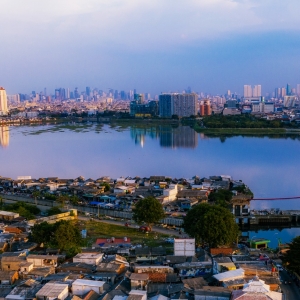The Stream, August 29, 2019: Flood Severity Increasing in Britain, Decreasing in Eastern Europe, Study Finds
The Global Rundown
A far-reaching study maps the impact of climate change on flooding in Europe. Research shows that more precipitation is expected in the Upper Nile Basin in coming decades, but the increased rainfall will likely be offset by hot weather and population growth. Tropical Storm Dorian is upgraded to a hurricane as it closes in on Puerto Rico and the Virgin Islands. Severe rainfall forces 900,000 to evacuate in southern Japan. The United Nations calls for improvements to water and sanitation systems worldwide.
“Water and sanitation systems don’t just improve health and save lives, they are a critical part of building more stable, secure and prosperous societies. We call on all countries that lack essential water and sanitation infrastructure to allocate funds and human resources to build and maintain it.” –Dr. Tedros Adhanom Ghebreyesus, the Director-General of the UN World Health Organization, in reference to inadequate water systems worldwide. A UN-backed study found that shortages of funding and human capital are a key reason behind inadequate water and sanitation in a majority of countries. WHO
Latest WaterNews from Circle of Blue
What’s Up With Water – August 26, 2019 — This week’s edition of What’s Up With Water includes coverage on water shortages in the Global South, approval of the California Safe Drinking Water Act, and Legionnaires’ disease.
HotSpots H2O: Hydropower Construction Heightens Political Pressure Along Mekong River — Low water levels are fueling tensions between those living on the Mekong River and those who aspire to wring electricity from the backbone of Southeast Asia by damming it.
By The Numbers
80 miles per hour (129 km/h) Maximum sustained winds of Hurricane Dorian as it neared Puerto Rico and the Virgin Islands on Wednesday night. Forecasters warn that the storm, which is en route to Florida’s east coast, could build to a Category 3 hurricane. NPR
900,000 Residents of southern Japan who were under evacuation orders after record-breaking rainfall caused floods and landslides. An additional million people were advised to leave their homes. In just two days, twice the usual rainfall for August fell over the southern island of Kyushu. Reuters
Science, Studies, and Reports
An international team of researchers led by the Vienna University of Technology analyzed river flow data from across Europe between 1960 and 2010, and found that the severity of flooding has increased in many areas, especially Britain and other parts of northwestern Europe. At the same time, the intensity of flooding in parts of southern and Eastern Europe decreased between this period. Researchers say the changes can be linked to a changing climate. Phys.org
On the Radar
A study by Dartmouth College in New Hampshire looked at future climate models for the Upper Nile Basin and found that increased atmospheric moisture could bring more precipitation to the region. The increased rainfall will likely be offset, however, by hot temperatures and population growth, which will heighten water demand. By 2080, an estimated 250 million people, or 65 percent of the Upper Nile Basin population, will be at risk of water scarcity. Science Daily
Coverage from World Water Week
Wednesday was day three at World Water Week, with continued coverage by Circle of Blue. Pictured, Circle of Blue Director J. Carl Ganter sits down to interview Silvia Cruz-Vargas of PepsiCo. Stay tuned, the full video recording will be made available soon. Picture © Cody Pope/Circle of Blue
Kayla Ritter is a recent graduate of Michigan State University, where she studied International Relations and Teaching English to Speakers of Other Languages. She is currently based in Manton, Michigan. Kayla enjoys running, writing, and traveling. Contact Kayla Ritter








Leave a Reply
Want to join the discussion?Feel free to contribute!